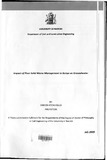| dc.description.abstract | One of the most obvious impacts of rapid urbanisation and economic development can be witnessed in the form of uncollected municipal solid waste. Solid waste tends to have moisture contents as high as 70%. This moisture translates into leachate as the waste drains. This study reports on solid waste management in selected towns in Kenya. It reviews the collection, handling, policy support, institutional development, private sector involvement, user participation, technical development and waste management.
The study revealed that the urban councils were grappling with challenges of preventing environmental degradation due to non-systematic solid waste management and the impetus in pollution control was rather slow and seems to be mostly crisis driven. Review of the institutional strength and development revealed a low collection efficiency (all were between 30 to 40 % in the study period) and not comparable to even the worst performing cities in the world. In the three towns, Nairobi, Mombasa and Kisumu, there should be a decentralisation of authority and administrative measures, to build the powers and capacities of local governments commensurate with their solid waste management (sWM) responsibilities.
In this study, waste from test holes at a dumpsite located next to residential halls at the University of Nairobi were investigated for selected quality parameters in the laboratory. A leachate extraction setup was also developed for long-term quality variation study. From the leachate quality results the specific conductivity, Biochemical Oxygen Demand (BOD), Chemical Oxygen Demand (COD), Total Dissolved Solids (TDs) and Iron modelled linearly, gave good results with coefficient of determination (r2) of 0.79, 0.73, 0.77, 0.88 and 0.75 respectively. The specific conductivity and TDs gave better results, with the poly fits of r2 values of 0.89 and 0.95 respectively. On the other hand, the Turbidity and BOD exhibited better r2 values of 0.71 and 0.82.
The other parameters tested in this study were not able to fit well in the three categories of fits, indicating the degree of variability in their biological and physical processes with time. The heavy metal concentrations expressed the widest variation over the study period, though the linear trend (with r2 values of copper 0.25; zinc 0.26; Iron 0.75) fitted better in the heavy metal concentration than the exponential fits. The samples revealed that the concentration of COD, BOD, total hardness, TDs, chlorides, nitrates, iron and conductivity decreased with depth while those of Dissolved Oxygen (DO), pH and alkalinity increased with depth. The study further revealed that the level of pollution in the leachate generated from solid waste was higher than that for the leachate after it infiltrates into the soil. The results of the parameters investigated were tested in linear and exponential models with the exponential fits giving the best possible results. The best fits were with the Total hardness, alkalinity, BOD, DO and TDS with r2 values of 0.7, 0.64, 0.73, 0.65 and 0.72 respectively.
The study concluded that solid waste management problems facing Kenya were due to the lack of an appropriate waste management system in the urban centres. Inefficiency contributed to pollution by accumulations in uncollected waste and use of poor disposal techniques. The underlying consequence of this state is the deterioration of the environment in the form of air, water and land pollution. The role of private sector participation in solid waste management was noted to be positive. The management of solid waste can be effectively addressed using a multi disciplinary approach, through an integrated solid waste management system in the country to accommodate the array of stakeholders' interests. The use of modelling in ground water pollution should be encouraged as it provides useful sensitisation facts on SWM. | en_US |

